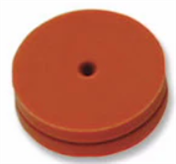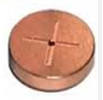GC Inlet Maintenance
Find links and part numbers to the consumables used in the video here.
GC Septum
- Inlet septa are used to maintain a leak-free seal at the GC inlet, even after repeated injections.

- If the septum has a dimple, the dimple should be facing upward, away from the inlet. The dimple guides the syringe needle through the inlet to minimize damage to the needle and ensure injection consistency.
- There are different options for septa that can be used on your GC, the Agilent GC inlet uses 11-mm septa. Click on the link below to learn more about the septa options that are available for your GC.
- Link to GC Septa page on Agilent website
- Link to Septum used in video
GC Liner
- Agilent offers a wide range of GC inlet liners to ensure proper volatilization and introduction of analytes onto the column. If you are not sure where to start with liner selection, check out our previous Beyond Peaks blog post, Which GC Liner Should I Use?
- An ultra inert liners was used in the video. These liners are delivered in exclusive Agilent touchless packaging with pre-installed o-rings. Not all liners come with the O-ring pre-installed.
- Check out more ultra inert liner offerings for your GC here
GC Liner O-ring
- The o-ring provides a gas-tight seal between the outside of the inlet liner and the inlet weldment.
- Agilent offers a fluorocarbon preconditioned GC sealing o-ring that is recommended if the inlet temperature is less than 350C. Check it out here.
- If the inlet temperature exceeds 350C Agilent recommends the graphite O-ring. Check out the graphite o-ring here.
Split Vent Trap
- The split vent trap is located in the back left corner of the GC if a Split-Splitless (SSL), Multi-mode (MMI), Volatiles Interface (VI), or PTV inlet is installed.
- The split vent trap has an o-ring on the end, as mentioned in the video. Click here for the split vent trap that includes 1 cartridge and 2 o-rings.
- The 8890 GC has a diagnostic called the ‘Split Vent Restriction Test’ that can confirm adequate flow through the split vent. During normal operation, the sample could condense in the split vent line and cause a restriction; if this test fails, begin by changing the split vent trap as shown in the video. If the restriction is still present it may indicate a restriction in the copper tubing between the inlet and split vent trap, call Agilent for support.
Gold Seal
- The soft gold surface plating naturally deforms when compressed to ensure a leak-free seal every time. The washer is necessary to ensure the gold seal is pressed up onto the base of the inlet rather than twisted onto the base of the inlet.
- Check out the standard gold seal here, click here for the ten-pack of gold seals!
- Agilent also provides an ultra-inert gold seal, click here for the ten-pack of ultra inert gold seals.
- Agilent also offers a gold seal with four flow channels to better accommodate large split flows at the inlet. Check it out here.

Early Maintenance Feedback Counters
- The question that comes up with maintenance is always: ‘How often?!’ The difficult answer is that it depends on the GC application. The GC can help you determine how often maintenance is needed and remind you at defined intervals.
- The 8890 GC has the ability to provide the time or run count between maintenance procedures to help a user understand when they typically do maintenance. With these time frames identified Early Maintenance Feedback counters can be easily set from the GC touchscreen to remind a user when to do the maintenance task and walk them through the task as seen in the video.
- Here is more information on the Early Maintenance Feedback Counters on 8890
